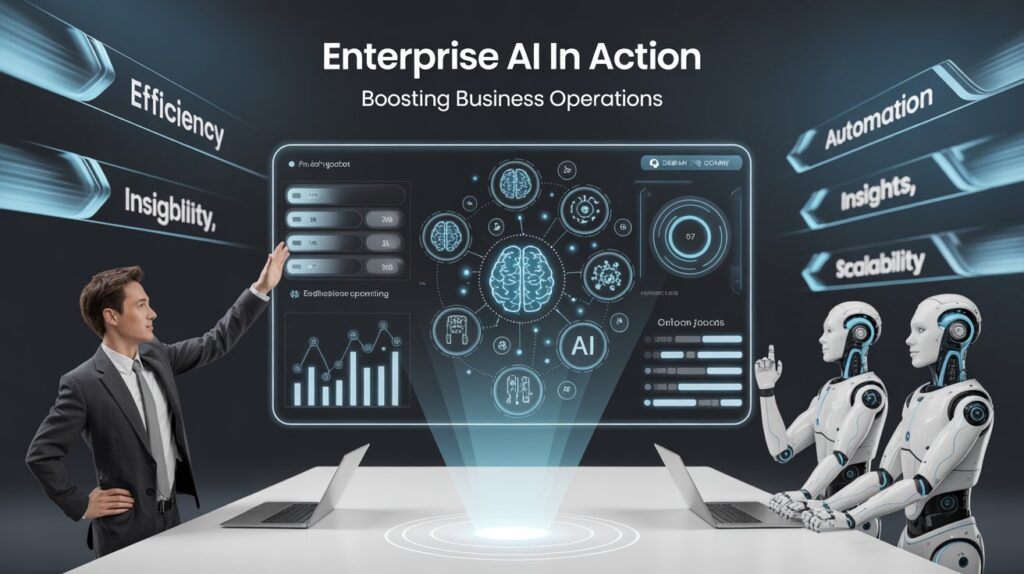Artificial intelligence has become a pivotal force in redefining how enterprises operate. Its integration into business processes has led to the evolution of enterprise AI platforms that optimize operations, enhance efficiency, and provide strategic insights. Keep reading to discover how a top enterprise AI platform can reshape the landscape of business operations.
Understanding the Role of Enterprise AI Platforms in Modern Business Operations
Enterprise AI platforms serve as the backbone for bringing artificial intelligence into the fabric of business operations. They provide a suite of tools for companies to automate processes, analyze large data sets, and create intelligent workflows.
Employing an enterprise AI platform can lead to significant changes in the operational structure of a business. It does so by seamlessly integrating with existing systems, thus enabling a more cohesive and responsive technological environment. Ultimately, the role of enterprise AI in operations hinges on its ability to process vast amounts of information, recognize patterns, and execute tasks with greater accuracy and efficiency than human workers.
Streamlining Workflow Efficiency With AI-Driven Automation
AI-driven automation has emerged as a cornerstone for enhancing workflow efficiency. When AI systems take over repetitive and time-consuming tasks, employees are liberated from the mundane aspects of their jobs.
Moreover, AI-driven automation ensures consistency in task execution, which is particularly beneficial in quality control. Through continuous learning algorithms, AI platforms can quickly adapt to changes in workflow, environment, or objectives, sustaining efficiency regardless of the dynamics of the operational landscape.
Another notable advantage is the reduction in human error, which inherently elevates the quality of the output. Automation tools can operate around the clock, which means businesses can maintain productivity even beyond standard working hours, leading to faster outcomes and higher throughput capabilities.
Enhancing Decision-Making With Predictive Analytics and AI
One of the most transformative aspects of enterprise AI platforms is their capacity to enhance decision-making through predictive analytics. AI systems can comb through massive datasets to identify trends and patterns that are imperceptible to the human eye.
Predictive analytics can forecast market changes, customer behavior, and potential risks with a considerable degree of accuracy. Armed with this knowledge, companies can adjust their strategies accordingly, seizing opportunities and mitigating threats before they fully materialize.
Integrating AI into everyday decision-making processes also democratizes data insights. It ensures that departments across the organization have access to the information they need to make educated decisions without bottlenecking at data analyst touchpoints.
Impact of AI on Supply Chain Management and Logistics
Supply chain management and logistics have historically been complex and unpredictable domains, which stand to gain significantly from AI integration. AI platforms can provide real-time visibility into supply chains, predict inventory needs, and optimize delivery routes by processing vast amounts of logistics data.
The implementation of AI in logistics goes beyond simple automation. Intelligent systems can manage unforeseen events by adapting supply chain strategies on the fly. For example, if a delivery route is disrupted, AI can quickly reroute shipments to minimize delays.
Additionally, through machine learning and AI, businesses are able to conduct what-if analyses to make strategic decisions about logistics. By considering historical data and future potentialities, these systems can identify the most effective approaches to shipping, route optimization, and even supplier selection, thereby establishing a more resilient and responsive supply chain ecosystem.
Overall, enterprise AI platforms are revolutionizing the way businesses operate by delivering improved efficiency, better decision-making, optimized supply chains, and a solid foundation for measuring the impact of AI integration. As companies continue to embrace the transformative power of AI, they can expect to see a significant boost in performance and a sustainable competitive advantage in their respective markets.

